By Ellen Cecil-Lemkin
Just last month, I was hired as a Faculty Associate for the UW-Madison Writing Center, and I could not be more excited to join this amazing team of administrators and instructors!
Joining a writing center team, in a lot of ways, feels like coming home. I started my journey in writing studies after working as an undergraduate writing consultant at the University of Central Florida under the direction of Mark Hall. It was there that I discovered my love for writing instruction (previously, I had sworn up and down that I would never be a teacher—famous last words, right?) and was encouraged to apply for graduate programs in Rhetoric and Composition. And while my path in writing studies took me in many directions, I found myself in a writing center as a writer and tutor.
My entwinement with writing centers meant that I had, as a tutor, offered numerous doctoral candidates writing advice on their dissertations long before I had begun working on my own. And while this meant I would typically only get to see snippets of projects here and there, occasionally I had the privilege of getting to work with a writer from the start of their prospectus to the final draft of their dissertation. Seeing these longer drafting processes prepared me both to write my own dissertation and to offer suggestions to other writers working on similar projects.
Thinking about my experience with writing centers along with my new leadership position on a staff of writing center instructors I have yet to meet in person, I thought it might be interesting to find out more about them by reaching out to learn more about their research and how it is shaping their writing center practices.
To frame this inquiry, I think it’s important to note that unlike many writing centers, all of our instructors at UW–Madison are graduate students in doctoral programs. While most of our instructors are from programs within the English department, we also have instructors from Second Language Acquisition, Art History, the Law School, Folklore Studies, and others—which speaks to the value that the Writing Center places on having instructors with diverse academic backgrounds. Further, the fact that our instructors are writers as well as scholars is something that informs their teaching practices and work with students.
In this blog post, we are proud to offer a snapshot of some of the exciting dissertation projects that our instructors are working on. We have asked six instructors to share with us, in their own words, the focus of their dissertation research. We think these projects demonstrate the depth of knowledge and a range of scholarly interests that our instructors hold, and we hope you’ll enjoy this exploration of their engaging research!
Gabrielle “Gabbi” Kelenyi (English)
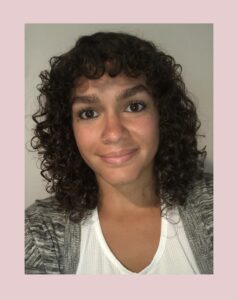 I am deeply interested and invested in what helps people feel like writers. Thus, for my dissertation, I am conducting community-engaged research with a writing group for nontraditional adult student writers that intends to support participants in developing a sense of writerly identity through consistent writing time and support as well as co-research about their writing practices. My goal, inspired by the belief that more intentional, informed support for adult learners and the normalization of nontraditional trajectories would benefit higher education, is to centralize their experiences to design inclusive, culturally-sustaining writing instruction.
I am deeply interested and invested in what helps people feel like writers. Thus, for my dissertation, I am conducting community-engaged research with a writing group for nontraditional adult student writers that intends to support participants in developing a sense of writerly identity through consistent writing time and support as well as co-research about their writing practices. My goal, inspired by the belief that more intentional, informed support for adult learners and the normalization of nontraditional trajectories would benefit higher education, is to centralize their experiences to design inclusive, culturally-sustaining writing instruction.
My dissertation research project has helped me think critically about how I work with students in the writing center during one-on-one consultations, during workshops, and as a writing group facilitator. I am much more intentional about helping writers with whom I’m working to direct our sessions, guide the trajectory of workshops, and create writing group spaces that work best for them. In this way, my dissertation has helped me find ways to achieve greater equilibrium between me as a writing center instructor and the writers with whom I work.
Rick Ness (English)
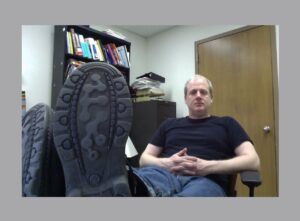 My dissertation, Vibrant Meter: Rhythm, Rhetoric, Romanticism, argues that Romantic poets used metrical experiments that convey rhythm as a fundamentally ecological phenomenon. Rhythm’s tension with meter exerts bodily and psychological effects on us that ultimately lie beyond the poet’s control and, thus, should be treated as part of a distributed agency consisting of author, reader, bodies, environments, and cultural memory.
My dissertation, Vibrant Meter: Rhythm, Rhetoric, Romanticism, argues that Romantic poets used metrical experiments that convey rhythm as a fundamentally ecological phenomenon. Rhythm’s tension with meter exerts bodily and psychological effects on us that ultimately lie beyond the poet’s control and, thus, should be treated as part of a distributed agency consisting of author, reader, bodies, environments, and cultural memory.
As a writing center instructor, I’ve had the opportunity to work with many dissertators one-on-one and in groups—as a graduate writing group leader and a co-instructor for both the Mellon-Wisconsin Dissertation Writing Camp and the workshop series “Getting Your Dissertation off the Ground.” These experiences and my own dissertation research have informed each other in very productive ways, especially with respect to understanding myself as a writer, working through the revision process, and treating writing as a more social activity.
Amanda Rose Pratt (English)
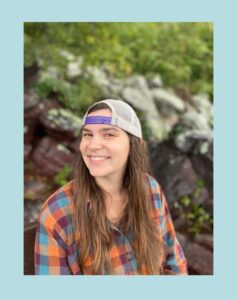
I study the rhetorical and ethical landscape of psychedelic substances across contexts. My dissertation project is situated at the intersection of rhetoric of health and medicine, science and technology studies, phenomenology, and anti-oppression—and has an underlying goal to contribute to important and timely conversations around equity in psychedelic spaces.
Read Amanda’s blog post on “Time, Space, and Energy: Graduate Student Tutor Experiences in the Writing Center” here.
Adam Schuster (English)
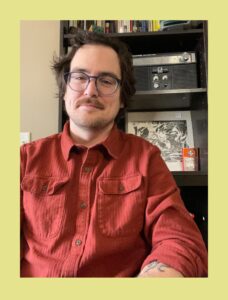 My dissertation examines how musical genres like the blues and jazz were instrumentalized during the Cold War and made to signify models of blackness that supported narratives of U.S. integration and exceptionalism. I argue that black artists challenged this appropriation through experimentation with literary forms, rewriting the discourses around this music and revising dominant ways of understanding and hearing race.
My dissertation examines how musical genres like the blues and jazz were instrumentalized during the Cold War and made to signify models of blackness that supported narratives of U.S. integration and exceptionalism. I argue that black artists challenged this appropriation through experimentation with literary forms, rewriting the discourses around this music and revising dominant ways of understanding and hearing race.
Working on this project has really opened my eyes to how porous writing- and disciplinary divides can be. Much of the research I’ve done involves working with texts that draw from multiple modes and disciplines, combining not just music and literature, but autobiography and historiography, academic and creative writing, not to mention lyrics and live performance. Working in a writing center that caters to all disciplines and modes of writing, I’m happy to continue the enriching work of crossing disciplinary divides and drawing from multiple modes of expression to tell a story.
Brenna Swift (English)
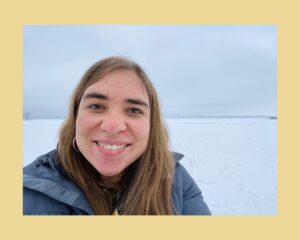
My dissertation explores how people with mental illness, chronic illness, or other kinds of disabilities experience journal writing. So far, I have interviewed 19 writers who use bullet journals, art journals, diaries, planners, vlogs, and an amazing variety of other journaling formats! Through my research participants’ contributions, I have learned that disabled writers are inventing their own accessible journaling styles for telling their stories and engaging in radical self-care.
My dissertation study was inspired, in part, by the many wonderful conversations I have had over the years with students and peer tutors in writing centers. While working as an assistant director for our undergraduate Writing Fellows program here at UW, I even discovered that some of our Fellows are avid bullet journalers who share their journals online! Journals have had a powerful role in my own life as a writer and teacher with a disability. In the final chapter of my dissertation, I’ll be exploring what the journaling experiences of disabled writers can teach writing center practitioners about the connections between writing and disability justice.
Chrissy Widmayer (Folklore)
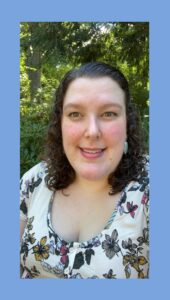
My dissertation examines how food traditions and stories told on, about, and over food become performances of intimacy in small groups. In a series of case studies, I look at my family’s Chaldean foodways and the performances and relationships that result from baking, cooking, and eating together. I also explore how a community group, Sweet Potato Comfort Pie, cultivates care and connection across boundaries of difference in their community through making and gifting pies.
My dissertation work has impacted my Writing Center work in a number of ways. First, thinking about intimacy and care in a moment when we are all required to be socially distant has required me to be deliberate in building relationships and offering grace to my students and colleagues, my loved ones, and myself. Second, as I struggle with my own writing, I feel solidarity with my fellow writers at all levels; in my teaching, I find myself noting suggestions and encouragement that I need to apply to myself as well. I feel grateful for the community the Writing Center provides me and will always be grateful for the connections I have been able to make in this space!
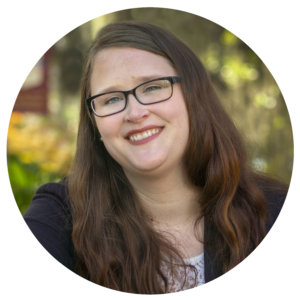
Ellen Cecil-Lemkin is the newest Writing Center Faculty Associate and a recent Rhetoric and Composition doctoral graduate from Florida State University. Her dissertation, Including Disability in Collaborative Writing Pedagogy, explored neurodivergent students’ experiences with collaborative writing. In addition to researching ways to create more accessible environments, Ellen also enjoys learning embroidery and parenting her infant son. Find her on Twitter or the web.

